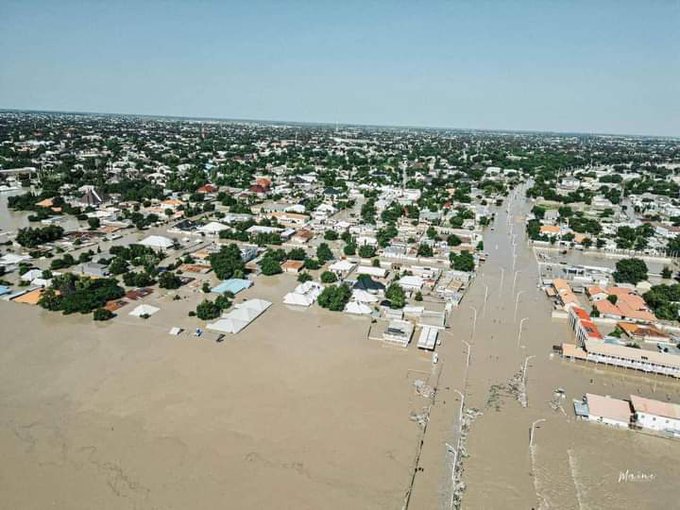Need for urgent support for Maiduguri flood victims
The devastating floods that recently submerged Maiduguri and displaced over 200,000 people underscore the urgent need for swift and comprehensive humanitarian intervention. The collapse of the Alau Dam, leading to widespread flooding, is a disaster of monumental proportions. The gravity of the situation calls for a concerted response from both the government at the federal […]

Borno flood
The devastating floods that recently submerged Maiduguri and displaced over 200,000 people underscore the urgent need for swift and comprehensive humanitarian intervention. The collapse of the Alau Dam, leading to widespread flooding, is a disaster of monumental proportions. The gravity of the situation calls for a concerted response from both the government at the federal and state as well as international humanitarian agencies.
Firstly, the displacement of such a large population presents a dire humanitarian crisis. With thousands of homes, businesses, and critical infrastructure destroyed by the flood, the immediate focus must be on providing temporary shelter, food, medical care, and psychosocial support for the victims. The emotional toll of this disaster, especially for those who have lost loved ones or remain unaware of their whereabouts, as described by one of the victims, Fatima Ali, cannot be overstated. Swift rescue operations must be prioritised by the National Emergency Management Agency (NEMA) to locate missing persons, with special attention to vulnerable groups such as children and the elderly.
Furthermore, the flood highlights the vulnerability of Maiduguri’s infrastructure. This is not the first time the city has faced such devastation, with the last comparable event occurring 30 years ago. Yet, the recurring nature of this disaster suggests that little has been done to strengthen flood management systems or build resilient infrastructure. The collapse of the Alau Dam exemplifies the urgent need for significant investment in the maintenance and modernisation of such critical infrastructure to avoid future recurrence. This is a responsibility the government must not shirk. Our government institutions are fond of waiting until disasters strike before rising to the occasion. This is quite sad.
The potential long-term impacts are also concerning. Beyond the immediate destruction of homes and businesses, farmlands have been submerged, which could lead to food insecurity in the region, especially in a state like Borno, already grappling with the effects of decade-long insurgency. The destruction of market areas like the popular Monday Market will also severely impact the local economy, leaving many residents without livelihoods. Many of the dealers have lost goods worth millions of naira of naira and life will never be the same for them again. Where are they going to start from? These are issues the government and other philanthropic bodies must look into with a view to offering some sort of succour.
- Flood: Borno announces reliefs account, urges donation for victims
- FG pledges to tackle socio-economic challenges
In addition to humanitarian aid, there is a pressing need for a well-coordinated disaster response framework in Maiduguri and other flood-prone areas across Nigeria. This includes improved early warning systems, better urban planning, and investment in flood prevention mechanisms. The government must also collaborate with international organisations to mobilise resources and expertise to prevent future occurrences.
There is also a need for residents of Maiduguri who are within the flood plains to relocate the designated Internally Displaced Persons camps already opened by the government. Also, there is a need for residents to be wary of walking through flood waters as there are reports that snakes, crocodiles and other dangerous animals have been washed into the waters from the Sanda Kyarimi Zoo in Maiduguri.
In conclusion, while the immediate priority should be rescuing those still trapped and providing relief to the displaced; there must also be a long-term strategy to rebuild the city and protect it from future disasters. The government must act swiftly and decisively, not just to mitigate the effects of the current flooding but to prevent similar catastrophes in the future. The people of Maiduguri cannot afford to wait another 30 years for a solution.
Modu Bolori wrote from Maiduguri, Borno State
